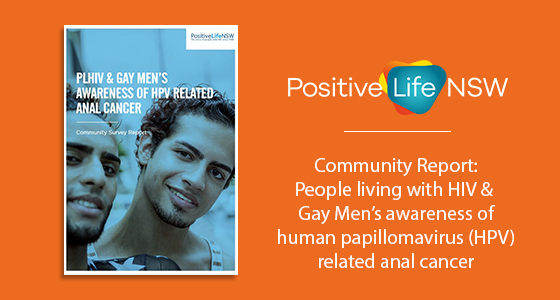
Positive Life NSW conducted a community based survey of 1,660 respondents to assess awareness of and screening for human papillomavirus (HPV) related anal cancer in people living with HIV and gay and bisexual men in Australia in 2016. While anal cancer is rare in the general population (1–2 cases per 100,000 individuals per year, anal cancer is significantly more common in people living with HIV and gay and bisexual men.
HIV positive gay and bisexual men experience the highest rates of anal cancer (approximately 50+ times that of the general population or 70–130 cases of anal cancer per 100,000 individuals per year). This makes it one of the most common cancers for HIV positive gay and bisexual men, after lymphoma and Kaposi’s sarcoma. HIV positive heterosexual men and women also have an increased risk of anal cancer with an incidence rate of 10–30 per 100,000 individuals per year, or 10+ times that of the general population. HIV negative gay and bisexual men have an anal cancer annual incidence rate of 5–20 per 100,000, or a risk rate 5+ -20 times that of the general population. In addition, the risk of anal cancer increases with age, and smoking tobacco is an independent risk factor.
Despite the increased risk of HPV-related anal cancer, survey results showed that HIV positive and HIV negative respondents demonstrated poor levels of awareness. Two thirds of HIV negative/unknown gay and bisexual men and half of HIV positive gay and bisexual men underestimated their risk. Only a third of HIV positive men and about one tenth of HIV negative/unknown men had received an anal cancer examination (DARE). Of particular concern was the low proportion of older gay and bisexual men who had received a DARE (~19% of men aged 45–54 years and ~32% of men aged 55 years and older). Less than 9% of men aged 18–24 had received HPV vaccination. The role of doctors is crucial in educating people living with HIV and gay and bisexual men about anal caner and the need for regular screening. However, our survey demonstrated poor levels of doctor-patient communication about anal cancer, with the majority of men never having discussed anal cancer with their doctor.
Recommendations:
- State and territory people living with HIV organisations, AIDS Councils and their peaks (NAPWHA and AFAO), prioritise the resourcing, development and distribution of education resources that increase awareness of, and screening for anal cancer in Australian people living with HIV and HIV negative gay and bisexual men.
- State and territory people living with HIV organisations, AIDS Councils and their peaks (NAPWHA and AFAO) work with the Australasian Society for HIV, Viral Hepatitis and Sexual Health Medicine (ASHM) to educate doctors about the need for anal cancer screening in people living with HIV and gay and bisexual men, particularly in gay and bisexual men living with HIV over the age of 50 years.
- Positive Life NSW, with support from NAPWHA and Femfatales, develops and implements a community-based electronic national survey targeting HIV positive women: 1) to raise awareness of HPV related cancer, including anal cancer, and 2) to assess awareness of risk and knowledge of symptoms suggestive of HPV related cancer, experience with screening and HPV vaccination.
- A working group is convened to: 1) advocate to state and territory health departments for the free provision of HPV vaccination to gay and bisexual men aged ≤ 26 years at sexual health clinics around Australia, 2) develop education resources to promote self and partner administered DARE in people living with HIV and gay and bisexual men, 3) progress pathology and cytology item numbers for anal cancer diagnostic tests, 4) increase doctor and patient awareness of HPV related anal cancer in people living with HIV and gay and bisexual men via conference presentations, publications and training, and by peer led education sessions at NAPWHA members meetings and the Treatment Outreach Network
Community Report:![]() People living with HIV & Gay Men’s awareness of human papillomavirus (HPV) related anal cancer
People living with HIV & Gay Men’s awareness of human papillomavirus (HPV) related anal cancer






